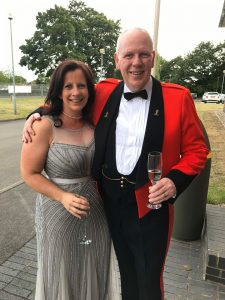Mental Health – The Messy, The Personal And The Positive
Musician, writer, conversationalist and mental health advocate Tabby Kerwin tells All4Brass about music, life, mental health, grief and how we can support better mental health in the brass band movement.
You could say ‘I was born into bands’ as they’ve been a part of my life since before I can remember. Firstly, Military bands and then brass bands from an early age with my first playing experience being around the age of 7 (I think!).

Having experienced brass bands as a player, band manager, conductor, educator, journalist, judge, publisher, enthusiast and now mental health advocate, I’ve seen it from every angle and have been so fortunate to meet so many people, physically and virtually along the way.
Brass bands has given me my highest of highs, but it has also given me my lowest of lows. Friendships, satisfaction and success gave way to darkness, stress, anxiety, depression and living with mental ill health.
It was dark and bleak and something I hid, because, 13 years ago it wasn’t what was expected or talked about; instead you took one of two options of ‘cracking on’ or ‘giving up’ of being in a brass band. I started with the first for a few years, but then opted for the latter.
It took a long time, and I mean years, to make any progress in my own head and once I did, the path wasn’t without its wobbles and setbacks but gradually, I dipped my toe into the banding pool, with caution and strict personal terms and boundaries.
I’m often asked if I miss my ‘old life’ in bands and the answer is ‘Yes.’ It gave me the best and worst of times and I met some amazing people, but brass bands have always been my passion and always will be and that’s why I knew over the years it was important to focus on my mental health, build my resilience and ultimately get people talking about mental health more, because, as it goes, there are many hundreds of people in brass bands around the world living with mental health issues, not talking about it and it’s also stopping them enjoying their passion.
This is something that needs to change. We need more talking about it and supporting the mental health of our musicians.
In 2018, just when I had really got to the point of being mentally fit after another relapse, my husband, well-known composer, arranger, conductor and tuba player Simon Kerwin, was diagnosed with cancer and just four months after diagnosis died of treatment associated complications in St. James’ Hospital, Leeds.

Mental ill health and grief are both messy and complicated things to experience and live with and when you put the two together, the reaction has potential to be toxic. But, thanks to many years of working on mental resilience and the support and love of Simon through it all, the prospect of living with grief was less frightening and more an opportunity to strengthen myself further and help others in the process.
After many years out of the intense banding loop, it was the kindness and support of friends in brass bands around the world that was so gratefully received. I found such a comfort in the connections and communication of musicians and the fact that people have more of a respect for the music of my husband now is humbling and I’m delighted when people share their musical and social stories about him.
I became aware that when someone is living with grief, their immediate brass band family, and disconnected family too, rally around them and this shows the truly wonderful support network that is in place. This was my personal experience and having spoken to many people about the subject so many have shared the experience of how being in a brass band was their lifeline through the tragedies of living with grief.
This is wonderful and heart-warming and shows the infrastructure of support is well and truly in place in our brass bands. But this is an infrastructure of support we need to build on in order to support better mental health in bands too.
I know, from my own experience and from talking to many other musicians, that so many people have left bands due to mental health issues. This could be anything from issues in the bandroom such as performance anxiety, bullying from conductors, stress of managing things or pressures on time, or issues outside the bandroom such as pressures at work or with family, relationships or finance.
We are all living under a huge amount of stress and never more so than now in the current global climate and that is why we need to utilise the support infrastructure that we know exists in our bands to make sure our movement doesn’t haemorrhage more players due to mental ill health.
With the right awareness, support and signposting to help, there are so many players that would still be going to band, rather than giving up their passion.
How do we do this? Well, it all begins with honest, open, non-judgemental conversation.
We’re quick to respond when we see someone grieving, but less likely to notice when they are anxious or depressed. We may not recognise the signs, often because people mask their reality and so many people don’t feel confident in the knowledge to say the right things to someone they suspect is living with mental ill health.
In honesty, sometimes there isn’t always a right or wrong thing to say, we just need to say something, even about a totally random subject, and if you’re considerate, caring and approach with kindness, the simple act of talking can help someone dealing with mental ill health massively.
By starting conversations, making mental health awareness and training a priority in our bandrooms we are going to actively support and help so many of our brass band musicians around the world…. and it starts with a simple conversation.
That one conversation could literally be the reason someone stays alive if they are experiencing suicidal feelings. By talking, by sharing, by supporting we are saving lives and bringing a new wave of positivity and strength into the brass band movement.
We all have a responsibility and we can all do more, but let’s make a start by talking about the subject that’s still considered a taboo.
I am always on hand to help and support anyone and by bringing a few hours of mental health awareness training into our bandrooms we can go a long way towards not just supporting each other but to keeping our bands flourishing.
 For more mental health support and training in your bandroom visit www.facebook.com/modefor or www.modefor.co.uk
For more mental health support and training in your bandroom visit www.facebook.com/modefor or www.modefor.co.uk
Tabby also has a group on Facebook dedicated to supporting brass musicians and mental health at www.facebook.com/groups/brassonthemind






